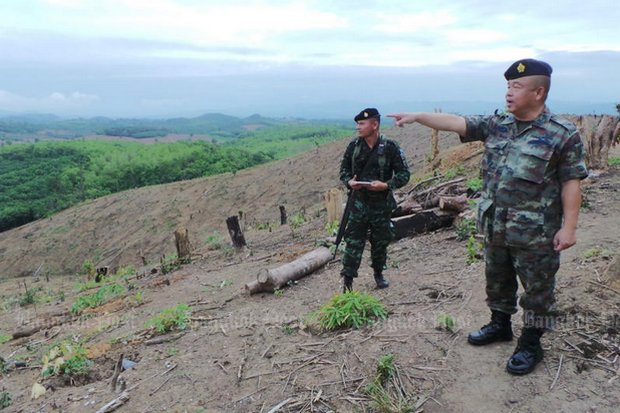
Third Region Army commander Vijak Siribansop had no idea he would still be answering questions about the extra-judicial killing of Lahu hilltribe rights advocate, Chaiyaphum Pasae, a full year after the incident occurred on March 17 last year.
Lt Gen Vijak, who leads active suppression squads against the heavy proliferation of drug smuggling in the North, even earned the notorious alias "Ti Auto" from Chaiyaphum's extra-judicial killing.
The incident, the commander said, does not discourage him from cracking down on transnational drug rings. He only needs to be more careful about his words, he said.
Combatting drug traffickers is his priority. He insisted there is no let-up in the authorities' fight against drug traffickers and couriers in the North under the army's jurisdiction he leads.
He is all ears to intelligence reports about frequent drug trafficking.
"About 500 million methamphetamine pills will be smuggled into Thailand soon," Lt Gen Vijak told the Bangkok Post, citing intelligence warnings from the Office of the Narcotic Control Board. The pills would be smuggled in over an unspecified period of time.
He admitted the high-profile Chaiyaphum's extra-judicial killing has generated much criticism which marred his reputation.
Chaiyaphum, who was suspected of possessing thousands of speed pills, was shot dead near a military-supervised checkpoint in Chiang Mai's Chiang Dao district. The military claimed the shot was fired because the suspect tried to throw a hand grenade at soldiers.
One soldier fired a single bullet in "self-defence" which killed the 17-year-old. Lt Gen Vijak said the soldier had no intention to kill the rights advocate.
The 3rd Army chief later made a controversial comment, saying he would have fired with an automatic gun if he were that soldier. The comment instantly earned him the alias "Ti Auto;" Ti being his nickname and Auto for the automatic gun.
"I just wanted to make a comparison," Lt Gen Vijak said, adding he wanted to explain that the soldier was well-trained while he, by comparison, would not have shot with such precision.
"It's a lesson learned for me. I have to be more careful when talking to the media," Lt Gen Vijak said. "I regret the incident."
Now he is concentrating on anti-drug operations in the far North where, despite the continued crackdowns, the drug situation has shown no sign of abating.
In crackdowns between April and May, authorities seized a combined 30 million speed pills, over one kilogramme of crystal methamphetamine, or ya ice, in targeted areas in Chiang Mai and Chiang Rai.
However, these drug interceptions, which were mainly based on intelligence reports and tip-offs, have stopped a large quantity of drugs from being trafficked and cost the drug network at least four billion baht.
His troops, together with state agencies, are preparing new sting operations in response to a report that about 500 million speed pills, produced by the two main Wa ethnic groups in Myanmar, will soon be slipped into Thailand.
The pills produced by the Wa Nua (Northern Wa) are recognisable by the "Y1" embossed on the tablets while the pills manufactured by the Wa Tai (Southern Wa) typically bear the "999" mark on them.
He said a failure to stem the inflow of the drugs would turn Thailand into a transit point for drug re-export to other countries.
The methamphetamine pills are delivered to southern Thailand before they are smuggled into Malaysia and Indonesia while the ya ice is destined for Australia, Lt Gen Vijak said.
He conceded soldiers alone cannot stamp out drug traffickers. They need help from other state agencies and people as well as from Myanmar on whose side of the border area some drug factories are reported to be produced by ethnic groups.
Lt Gen Vijak said the armed ethnic rebel groups, including the Wa, have not agreed to peace talks with the Myanmar government. The proposed talks are believed to hold promises for a permanent drug eradication plan. Their long-running internal conflicts have motivated minority groups to keep selling the drugs as they need money to buy weapons.
Lt Gen Vijak said allegations had arisen that some weapons were sent via courier service companies from the eastern border provinces of Thailand to the northern border and supplied to the ethnic minority groups. The companies had no idea they were transporting weapons.
Thai and Myanmar authorities are working together to tackle the weapon and drug problems. "We turn to each other for help," Lt Gen Vijak said.
"They [Myanmar] will help us crack down on drug traffickers while we intercept the weapons and block them from reaching minority groups in Myanmar."
Lt Gen Vijak said the Thai authorities are fully able to stop arms smugglers.
The commander said the authorities have sent details of 18 Thai drug suspects to Myanmar's narcotic agency which will arrest them. The suspects are thought to have fled to the neighbouring country.
"I also learn that Myanmar has increasingly put pressure on the Wa armed groups," he said. As a result, large quantities of methamphetamine pills were seized in Tachilek, opposite Mae Sai district in Chiang Rai. These anti-drug operations have built an image of Lt Gen Vijak as a drug buster of the North.
However, there is another side to the commander -- Lt Gen Vijak can cook up a storm.
The former student of Class 18 at Armed Forces Academies Preparatory School is known to his friends, including his close friend, 4th Army chief Lt Gen Piyawat Nakwanich, as "chef Ti".
His skills and fondness of culinary arts have seen him cook for family, friends and customers. He runs a restaurant in Lampang, his home province, and plans to open a branch in Nan.